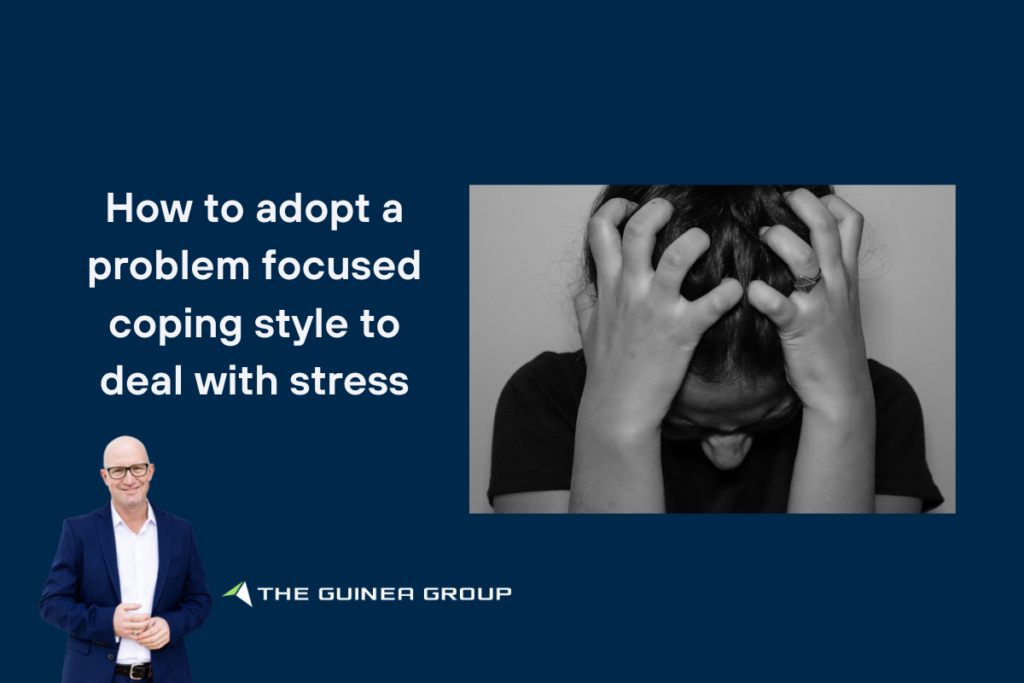Anton Guinea
Entrepreneur, Speaker, bestselling author, and founder of The Guinea Group of Companies. For over 15 years, Anton has helped leaders move their teams to become psychologically safe, physically safe and overall better versions of themselves.

How to adopt a problem focused coping style to deal with stress

We all cope with stressful situations differently. Depending on the level and the nature of the stressful situation, or event. Over the past several decades researchers have identified the main coping styles of individuals, and it turns out that a problem-focused coping style is the best way to deal with stressors.
Stressors might include what psychologists call a ‘stressful live event’ (like moving house or losing a job), or it might include a major catastrophe at work. Like a serious safety incident, or a flood or an economic crisis.
As well as a problem-focused approach, there are two other coping styles identified in the research, that we choose, to cope with such events. These include emotional-focused and avoidant coping styles. Here is an overview of each style.
1. Problem-focused
If you are someone who adopts a problem-focused approach to coping with stressors, you are someone gets into action. You are someone who addresses the problem head on, with a focus on taking action to address the issue or the challenge.
Being problem-focused is about taking ownership and responsibility for either solving or minimising the problem. With whatever resources are available to you at the time. This coping style is about doing a root cause analysis and addressing what it is that is causing the stressor. And potentially having the additional focus or preventing reoccurrence.
Problem-focused coping is believed to be the most effective way to cope with stress, as it is action orientated. It means that the stressed person can take their focus off what they are feeling and focus on what they are doing, or what others are doing. It is about collecting information, making decisions about the situation, and responding to the challenges of the situation with the clearest thinking possible.
2. Emotion-focused
The next best way to cope through a stressful life event, is to take an emotion-focused approach. “Emotion-focused coping is a type of stress management that attempts to reduce negative emotional responses associated with stress. Negative emotions such as embarrassment, fear, anxiety, depression, excitement, and frustration are reduced or removed by the individual by various methods of coping” (credit: Simply Psychology).
There are times when this coping strategy might be the most effective. Think about those time with the stressor is out of your control. Like an economic crash. Or the death of a loved one. Or something else that can’t be addressed through problem solving. This is actually the toughest coping strategy, as it takes a massive effort, and a commitment to emotional control. Things like mediation, breathing, focus change, or even medication are some of the tools you can use to adopt this coping strategy.
In saying the above, this strategy is still a winner at any stage, and for me personally, the one that I go to. And most specifically, the tool that I pull out of the toolbox is the skill of reframing the situation. That is, putting a different spin on the stressor, and somehow, as hard as it can be, finding the positive. Turning the lesson (stressor) into a blessing (silver lining). Life gives us two types of emotional experiences – lessons or blessings. The sooner we can turn a lesson into a blessing, the quicker we can use emotion-focus to help us get through stressful events.
3. Avoidant-focused
As the name implies, an avoidant coping style in one where you pretend the event or the stressor doesn’t exist, and you avoid dealing with it. Physically, and emotionally. This is easy for some people; the vast majority of humans are not able to avoid a situation that causes them stress.
Generally, avoidance is only a short-term measure. At best. It does nothing to help you cope, really. In some cases, avoidance has been related to very negative outcomes for victims of cancer, say, where instead of addressing it, the victim avoided it. Pretended it didn’t exist and passed away.
For me, I feel like short-term avoidance could lead to long-term issues. But I would have to read some more research reports to validate that thought process.
In summary, when you are confronted by a stressor, try to get into action and do what you can to address the issue. Then, deal with the negative emotions that it causes. And try to reduce the impact of those negative emotions. Avoid the issue, as a last resort, remembering that you might have to eventually deal with it.
And please click the image below if you’d like to chat about what leadership means to you.
If you would like to learn more about Anton or The Guinea Group, please click here to book into Anton’s calendar, to:
UPGRADE your Mindset
UPSKILL your Leadership
UPLIFT your Teams
About Anton
Anton has dedicated his working life to helping leaders to upgrade their mindset, upskill their leadership, and uplift their teams! With a focus on helps leaders to better lead under pressure. Anton is an entrepreneur, speaker, consultant, bestselling author and founder of The Guinea Group. Over the past 19 years, Anton has worked with over 175+ global organisations, he has inspired workplace leadership, safety, and cultural change. He’s achieved this by combining his corporate expertise, education (Bachelor of HR and Psychology), and infectious energy levels.
Work With Anton!
Sources
https://www.simplypsychology.org/stress-management.html
Subscribe to our Newsletter
